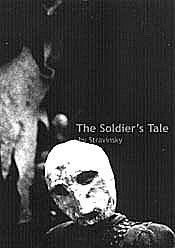The Soldier's Tale is the first production by an innovative new company of performers, puppeteers and musicians. Some performances have been followed by jazz, and readers can be recommended to choose those evenings for their visits (details below).This 1918 collaboration with the French-Swiss writer C. F. Ramuz took place whilst Stravinsky was living in Switzerland, during and after the War. It was based on Russian folk material, but influenced by pasodoble, tango and ragtime, with chorales at its climax. The soldier returning home is thought to reflect Stravinsky's self-imposed exile from his homeland. It is a masterpiece of musical economy born of hard times.
The unique instrumentation (cl, bn, cornet, trbn, perc, vn, db) can rarely have sounded better than in this confined fringe theatre space, the players, expert Trinity College of Music students directed unassumingly by percussionist Pete Flood, divided either side of a raised puppet stage. Originally the cautionary tale was narrated, and enacted by three actors and a female dancer. Nowadays a Suite, for instruments alone, is given more often; and Stravinsky's arrangement of Five Movements for clarinet, violin and piano is also heard regularly. One can begin to find the recitation a little tedious after hearing The Soldier's Tale too many times - this version perhaps gave us the best of both worlds, by preserving the music in its entirety but telling the story in puppet-mime, which demands that the audience works too!
Story telling with puppets is a Russian speciality and a highly developed theatrical skill. The two puppeteers Cath Hunter and James Marson (fully visible, though clothed in black) made all the puppets and deftly manipulated their many characters so as to suggest a quite complex narration of events, with the body language of movement and changing emotions. A few clues to help those new to Histoire du Soldat are given by a 'teacher' puppet, who uses the walls as a blackboard and chalks on a few paragraphs of the original story from time to time. With about five rows of seats, everyone is close enough to see all the detail and to become involved in these imagined creatures, an experience very much like the way that children become immersed in stories.
This thought-stretching piece of musical theatre continues at Southwark Playhouse (020 7620 3494) until 15 April and can also be seen 12-14 May at Battersea Arts Centre (020 7223 2223) - definitely worth catching.
Peter Grahame Woolf
Lol Coxhill & Veryan Weston
The second half of the Southwark Playhouse programme was, in its own way, almost as delightful - a surprise appearance by the soprano saxophonist Lol Coxhill, one of the true originals of British jazz. Something of an outsider, Coxhill rarely performs with a larger ensemble than a duo - indeed, his reputation is largely based on extended solo improvisation - free, post-Coltrane blowing sessions, always engaging, but often so loosely structured that they seem to lack any very evident sense of logic.
Here Coxhill was twinned with Veryan Weston, a pianist with whom he had played in the past, but who was working with him again, apparently without rehearsal, for the first time in several years. The result was quite remarkable, despite the fact that the Playhouse's battered upright piano was no Steinway, & that initially the saxophonist seemed to be having trouble with his reed.
The set, unusually for Coxhill, consisted almost entirely of standards - 'Lover Man', 'I Can't Get Started', 'Somewhere Over the Rainbow', 'Night in Tunisia', & so on - but these were standards as you'd never heard them before - approached obliquely & usually without any obvious statement of their themes, dissected, deconstructed & quirkily reassembled, always in a witty & unexpected manner. When in the past I have heard Coxhill play it has usually been in a freely improvised context, with the likes of Derek Bailey & Tony Oxley; here, the duo, while more firmly anchored, were by no means inhibited by the familiar tunes they had chosen to play.
Weston's piano playing, often reminiscent of Bud Powell, but full of allusion & quotation, was a celebration of the music's history - now sounding like a pianola, now like Fats Waller, now Monk, now Abdullah Ibrahim, once in a while even like Cecil Taylor. One had the feeling that, whilst much of the time Weston seemed to be leading the way, this was an encounter between two well-balanced equals, each listening intensely to the other - Coxhill throughout half-turned from the audience, hunched over a vertically held instrument, & inches only from the keyboard.
Lol Coxhill, famous for his sardonic humour & bearing a more than passing physical resemblance to Alf Garnett, is one of the great characters of British jazz, but, regrettably, one whom it's quite hard to see these days. Most of his recordings, like the wonderfully titled 'Fleas in Custard', are now unavailable. A cross-section of his work can be heard on a CD which includes a track recorded on Hungerford Bridge, where in leaner times Coxhill was eking out a living as a busker; good value, if uneven (Ear of Beholder - Miles SEECD 480). Anyone wishing to see more of this truly original performer would do well to track down Frog Dance (1983), a characteristically oddball film portrait directed by Richard White for the Arts Council.
Colin Still

 Return to:
Return to: